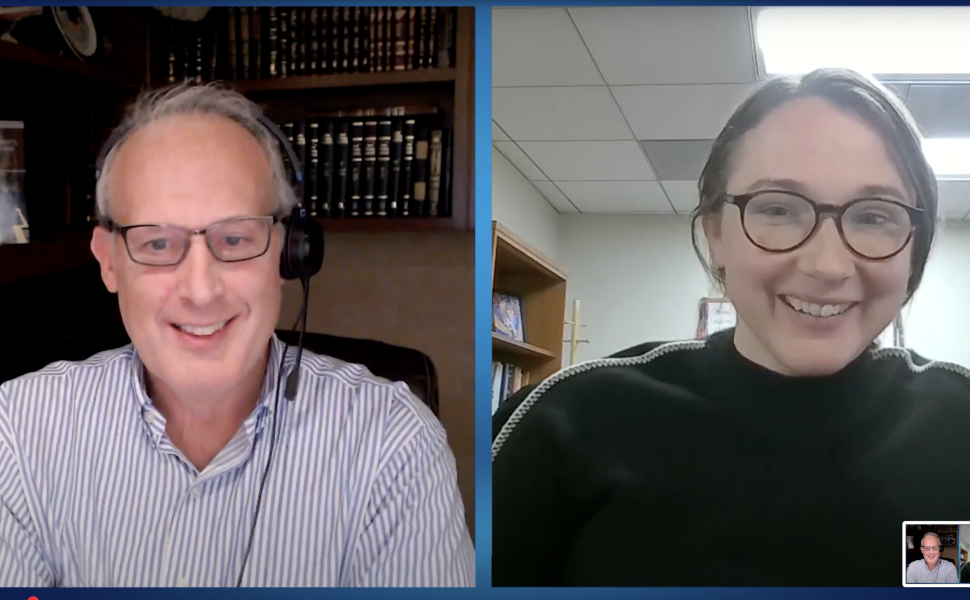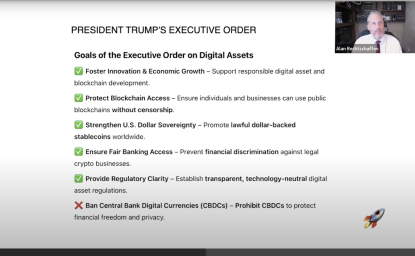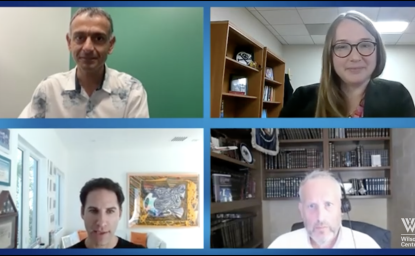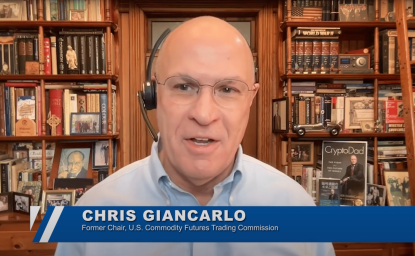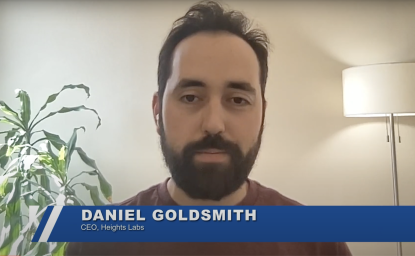Narrator: Welcome to Blockchain Explained, a podcast about opportunities, challenges, and trends in blockchain technology. Whether you're a beginner or an expert, a developer or just crypto-curious, this podcast is for you. It features industry leaders and government officials discussing the world of distributed ledgers, cryptocurrencies, and the metaverse. And now, here are your hosts, Alan Rechtschaffen and Kellee Wicker.
Alan Rechtschaffen: Welcome everyone back to the Blockchain Explained, it is our final broadcast of the 2024 year, which has been an incredibly exciting year. I'm here with my wonderful co-host, Kellee Wicker, who runs all the science and technology at Wilson Center, who knows everything about what's going on in artificial intelligence and in blockchain. And we're going to talk a little bit about the convergence of those two technologies next year, but today, we're going to wrap up 2024 and tell you some of the things that we saw. And with that, I'll introduce my co-host Kellee. And Kellee takes it away.
Kellee Wicker: Thanks, Alan. I can't believe how much stuff happened this year, especially in crypto, but kind of just in everything. And I think, you know, the election really kind of put the cherry on top for blockchain. We saw that this is the year for crypto. This is the year America really starts to take this seriously, and we start seeing what can we do with this technology, and how can it grow? Alan, I know, congratulations. You have yet another patent in this space on this tech. So obviously you're very plugged in. Tell me a little bit about what you saw in crypto that we're walking away from now in 2024 and what we have ahead of us in 2025.
Alan Rechtschaffen: Yeah. So it's interesting the patent that the second patent that we just got awarded has to do with using cryptocurrency for corporations, sort of treating cryptocurrency like loyalty points, and being able to trade them and get discounts for them, and opening up all sorts of exciting opportunities by having this corporate-type cryptocurrency, sort of like a corporate version of cbdc, central bank digital currencies, but on a corporate level. And really, when we started out this year, you'll recall, we talked a lot with a lot of great guests, and we can talk about some of the ones who appeared. We talked about the utilization of the different forms of technology that are related to blockchain, and how you could use it, and how you define use cases. As the year progressed, that that was particularly important and kept evolving, and we had some great guests who identified some of the the wonderful things you can do with blockchain technology because of its immutability and its reliability. But what I think happened with the election of Donald Trump is there's a lot more focus on the monetary policy and the fiscal policy implications of cryptocurrency, specifically with Bitcoin, but going beyond Bitcoin, just what is the nature of the relationship of this crypto asset to the US dollar. And you have a president who is the self admitted crypto president, and I think we have to see how that plays out. You know, he's put together designates for his cabinet. He put together a head of the SEC Paul Atkins, who's incredibly crypto friendly, he designated Scott Besant as the Secretary of the Treasury, who not only is the most pro crypto Treasury Secretary that we've ever seen, but is incredibly knowledgeable about how the dollar works. He runs a hedge fund. He worked with George Soros. So here we have this, this integration of cryptocurrency in thinking about fiscal and monetary policy issues. And I think that's going to be the watch word for 2024 is how this actually plays out.
Kellee Wicker: Yeah. And, you know, you kind of touched on this a little bit, but we had some really interesting interviews earlier this year where we were talking to people about, like, you know, digital assets for cultural institutions, digital assets for creatives. And those were super interesting applications. We're still very interested in that. But you kind of saw our guests over the years, shift towards looking at it as a fiscal instrument and the just the power it could have. We had Kyle Hauptman, who heads up the National Credit Union Administration. We had Chris Giancarlo, who was the former chair of the CFTC, and they really talked about just how much this could do, and it's been very obvious, I think we're not, we weren't really ready for this much innovation in the financial space. And a couple of our researchers were working on some of our digital assets products. Talk a little bit about how we never are ready. When credit cards first came out, everybody was not ready for that. And they referenced Burger King, sort of taking credit cards, and people acted like it was the end of the world. And now you can't even imagine a world without credit cards. It's crazy. And it seems like maybe we're in that moment we can actually start embracing and seeing how does crypto fit in to our financial system? I know this is always where you shine, Alan.
Alan Rechtschaffen: Yeah. And you know, I'd like to give a shout out to a guest we had over a year ago, which was Senator Lummis, who talked a lot about the role of bitcoin in terms of fiscal responsibility. And as we have seen, the ballooning debt in the United States, the idea of thinking about where cryptocurrency plays into that is incredibly important. And this has been a real sea change from where we were, when we had an executive order from President Biden, which was very focused on the regulation, and now it is very focused on regulating with an eye towards utilization in a way that can be helpful from a fiscal and monetary policy perspective. And so this is really a turning point, I think, in cryptocurrency, in the blockchain, because the reality is, and you're 100% right. I mean, one of my favorite guests we had this year was Ross Venokur, who talked about Hollywood and all, I know Hollywood's a thing anymore, whatever, whatever creative people, wherever creative people are doing their creative stuff, and how they were using the blockchain to fund movie projects and to expand on things that they were doing. But I think that what we're going to see happen is with this increased focus, this enhanced focus on cryptocurrency, the one use case for blockchain, of being a currency, with the enhanced focus on that, that is going to have a derivative effect that's going to impact the technology as a whole. Because, you know, it's like Dillinger said, you know, you go to where the money is when there's this much money that's being discussed and being utilized as part of the national thinking about the current fiscal status of the United States. That has got to be helpful for blockchain technology more generally, if for no other reason but for security reasons.
Kellee Wicker: I want to talk a little bit about what, you know, we were talking about what's on tap for America with blockchain, but I want to talk a little bit about what's on tap for us next year with blockchain, and a few things that outside of the podcast with our digital assets forum, you're going to be hearing some key themes. One will be understanding misconceptions around illicit finance and sanctions evasion, what really is happening in these systems, what is not, what are the myths that you've heard, and what's the role of government to close those loopholes. And then we're going to also talk about what else is being built in blockchain. What are the other applications, things like decentralized infrastructure, decentralized social networks. And then the third tranche we're going to be talking about is, how can cryptocurrencies offer financial freedom for people living in repressive regimes? And I'm sure you're going to hear those themes come up on this podcast as well. But Alan, what do you hope to see on our podcast next year?
Alan Rechtschaffen: Yeah, I'd like to say integration of those themes with this broad sector essence is going to look at cryptocurrency in the context of what he does as Secretary of the Treasury, what Paul Atkins the assumption being that these designates, get confirmed, that Paul, what Paul Atkins is going to do in terms of identifying what is a security a lot of our time in the past year, and a lot of the fear factor that we've seen from corporate utilization of digital assets and of cryptocurrency was the uncertainty of the role of the SEC with regards to what people were doing on the blockchain. So I'd like to see how that plays out in the integration of the regulatory concepts, the fiscal and monetary policy concepts, with the technology concepts. And then one area where I'd love for you to speak. I know this is outside of blockchain explain, but I know that in January, we're going to talk a little bit about security issues using artificial intelligence, how artificial intelligence plays into all this. Because artificial intelligence, I think, has been best described not as a new form of internet, but a new form of electricity. It's going to be everywhere, and it's going to be integrated into everything. So I'd love to hear what you're seeing in terms of artificial intelligence, when you put on your artificial intelligence hat, not that your intelligence is ever artificial, but that when you put on your hat, as being an expert in artificial intelligence and policy and how this is going to all come together in the context of 2025.
Kellee Wicker: I'm really interested to see what we can do. You know, you mentioned AI will be in everything. I feel like, you know, we talk about AI being an ingredient technology, not really a standalone thing, but kind of part of everything else. I think blockchain is kind of the same way digital assets is an ingredient that you can mix with other things. There's a lot of hope that blockchain integration with AI can solve some of these big questions that we have about, you know, with the rise of synthetic media, how do you know what's true? How can you authenticate the source of something? With the rising need for compute, how can we have distributed compute? Where do we store our data? Like their blockchain has a lot of possible answers to those questions. We need to figure out how it works. So I'm really excited. I'm glad you brought that up. I hope that we do get to really unpack that and to be a part of the voices that are helping policymakers understand the possibilities and what's going on in the technical world.
Alan Rechtschaffen: Yeah, I'd also like to bring in some of our colleagues at Wilson, because one of the things that the new Secretary of the Treasury is going to have to focus on in the new administration is going to have to focus on is the idea of CBDCs that are arising in other countries. China has its own central bank, digital currency, totally not the type of thing that the United States would focus on in terms of privacy issues, in terms of control issues. It goes against a number of American values freedom and privacy parenthetically, the information that's gathered by the utilization of a cbdc of China is getting more exposure to their central bank digital currency is that they get data points which can be used for artificial intelligence. Because, as I've learned from you in some of the work that you're doing with artificial intelligence, is artificial intelligence is only as good as the data set that you're using to study, to create the intelligence or to feed the intelligence. So I think that that is one of the things that the administration is going to be sensitive to, is how they are going to utilize cryptocurrency, the blockchain, to be sensitive and aware of what's going on abroad in terms of efforts for CBDCs.
Kellee Wicker: Yeah, and those are such big questions, and I know we want to make sure that policymakers have the information they need, first of all to understand it. It's just, it's a Wild West. This is all new. But you know, you made the point about the values that underpin things like the digital Yuan, and that's something that we talk a lot about all the work that we do at the Wilson Center, talking about science and tech. It's not about the tech, it's about the values that underpin the use of the tech, and it's about how those values are being spread or not being spread with the decisions we make as a country, and so I'm excited to get more into that next year. I know we were going to keep it short this time, since it's just the two of us, but I want to make sure that everybody knows we will be back in January, hopefully talking about these themes on AI and blockchain, and we look forward to bringing on a lot of new and exciting guests next year. Alan, any last words?
Alan Rechtschaffen: Well, just the idea of the convergence of technology, monetary, fiscal policy, the ability of Wilson to understand what's going on regionally around the world, the integration of your your experience with with artificial intelligence, my experience with financial markets and fiscal policy, I think that we have a lot of good stuff to talk about that's going to be very valuable. And our partners, our listeners, our watchers, the people on the Hill, the people in the executive, you know this, this may have been the Wild West, but there's a new sheriff in town, so we'll have to see how that actually plays out.
Kellee Wicker: Yeah, I'm looking forward to it. It'll be crazy.
Alan Rechtschaffen: Me too. Very Happy New Year to you, Kellee. I hope I see you before, but I want to wish you and all our listeners, watchers and fans, a wonderful, wonderful new year, wonderful, wonderful, 2025 and everything that you wish for yourself and your family you should get.
Kellee Wicker: Yes, Happy New Year to everyone. And I will see you next year. Thanks. Thanks, Alan.
Narrator: Thanks for listening to another episode of Blockchain Explained. Please note, nothing in this podcast should be construed as investment advice. Want more clear-eyed analysis of this exciting technology? Search for Digital Assets Forum at the Wilson Center for research, event recordings, and more. Want to ask our hosts a question? Write to STIP, S-T-I-P, at wilsoncenter.org (stip@wilsoncenter.org) with your thoughts. Thanks again, and we'll see you next time on Blockchain Explained!
